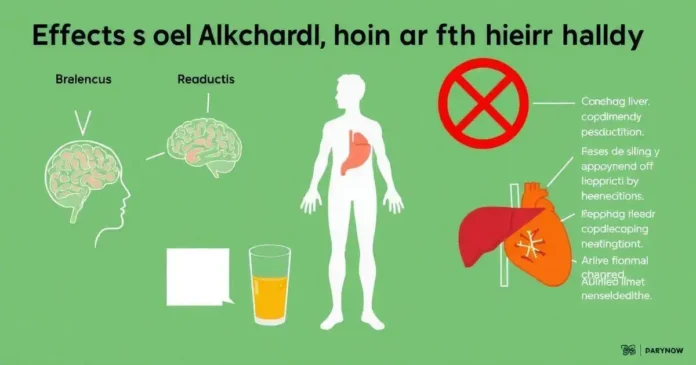Alcohol is a commonly consumed substance that can have various effects on the human body. From immediate impacts on coordination and decision-making to long-term consequences on organ function and mental health, understanding the full scope of how alcohol influences your body is crucial. In this article, we delve into the intricate ways in which alcohol can impact different systems and functions within your body, shedding light on the importance of mindful consumption.
The Effects of Alcohol on Your Brain
Alcohol can have immediate and long-term effects on your brain. When you consume alcohol, it quickly enters your bloodstream and reaches your brain, where it can impair judgment, coordination, and decision-making. According to the National Institute on Alcohol Abuse and Alcoholism (NIAAA), excessive alcohol consumption can lead to memory issues, difficulty concentrating, and even cognitive impairment over time.
To track your alcohol consumption and its effects on your brain, consider using the “AlcoDroid Alcohol Tracker” app available on Growth Pixel. This app allows you to log your drinks, track your blood alcohol content, and monitor how alcohol impacts your brain functions over time.
Additionally, seeking professional help from a healthcare provider or counselor can provide you with valuable insights into how alcohol affects your brain and how to manage its impact effectively.
Regularly monitoring your alcohol intake and staying informed about its effects on your brain is crucial for maintaining good cognitive health and overall well-being.
Understanding How Alcohol Affects Your Liver
Alcohol metabolism primarily occurs in the liver, making this organ particularly vulnerable to the harmful effects of excessive drinking. Chronic alcohol consumption can lead to liver inflammation, fatty liver disease, alcoholic hepatitis, and ultimately cirrhosis.
To better understand how alcohol impacts your liver, you can use the “LiverWell Mobile App” recommended on Growth Pixel. This app provides information on liver health, tracks your drinking habits, and offers personalized recommendations to reduce alcohol-related liver damage.
Educating yourself about the effects of alcohol on your liver can motivate you to make healthier choices, reduce alcohol intake, and prevent the progression of liver diseases associated with alcohol abuse.
Consulting with a healthcare provider or a liver specialist can also help you assess your liver health, detect any early signs of liver damage, and receive guidance on maintaining a liver-friendly lifestyle.
How Alcohol Impacts Your Heart and Circulatory System
Excessive alcohol consumption can have adverse effects on your heart and circulatory system. Alcohol abuse is linked to high blood pressure, irregular heartbeats, and an increased risk of cardiovascular diseases such as heart attack and stroke.
To monitor the impact of alcohol on your heart health, you can use the “Heart Rate Monitor” app available on Growth Pixel. This app allows you to track your heart rate, monitor changes in your cardiovascular health, and assess how alcohol consumption influences your heart function.
Understanding the connection between alcohol consumption and heart health can empower you to make informed decisions about moderating your drinking habits and prioritizing cardiovascular wellness.
Incorporating regular exercise, maintaining a balanced diet, and seeking guidance from a cardiologist can further support your efforts to protect your heart and circulatory system from the harmful effects of alcohol.
**The Dangers of Excessive Alcohol Consumption**
Effects on Physical Health
Excessive alcohol consumption can have severe effects on physical health. Alcohol is a known carcinogen, increasing the risk of developing various types of cancer, including liver, breast, and colorectal cancer. Additionally, alcohol abuse can lead to liver damage, cirrhosis, and pancreatitis. It also weakens the immune system, making the body more susceptible to infections and illnesses.
Impact on Mental Health
Alcohol abuse can have detrimental effects on mental health. Chronic alcohol consumption is associated with an increased risk of developing anxiety, depression, and other mood disorders. It can also impair cognitive function and memory, leading to difficulties in concentration and decision-making. Long-term alcohol abuse can contribute to the development of mental health conditions.
Social and Behavioral Consequences
Excessive alcohol consumption can have negative social and behavioral consequences. It can lead to strained relationships, domestic violence, and financial problems. Alcohol abuse is often linked to risky behaviors such as driving under the influence, which can result in accidents and legal consequences. Additionally, alcohol addiction can isolate individuals from their social support networks.
Financial Burden
Long-term excessive alcohol consumption can impose a significant financial burden on individuals and society as a whole. The costs associated with healthcare services, legal fees, and lost productivity due to alcohol-related issues can be substantial. Alcohol abuse can lead to unemployment and financial instability, further exacerbating the economic impact of excessive drinking.
Role in Accidents and Injuries
Alcohol consumption increases the risk of accidents and injuries. Impaired judgment and coordination caused by alcohol can lead to falls, burns, and other unintentional injuries. Driving under the influence of alcohol is a major cause of road accidents and fatalities. Excessive alcohol consumption significantly elevates the likelihood of being involved in a harmful incident.
Conclusion
Understanding the effects of alcohol on the brain, liver, and heart is crucial for maintaining overall well-being. Alcohol’s immediate and long-term impact on cognitive functions emphasizes the importance of monitoring consumption levels and seeking professional guidance when needed.
When it comes to liver health, being informed about how alcohol metabolism affects the liver can empower individuals to make healthier choices and prevent the progression of liver diseases. Utilizing resources like the “LiverWell Mobile App” can provide personalized insights to reduce alcohol-related damage.
Furthermore, the connection between excessive alcohol consumption and heart health underscores the need for moderation and informed decision-making. Monitoring heart health through apps like the “Heart Rate Monitor” can aid in understanding the influence of alcohol on cardiovascular wellness.
Excessive alcohol intake not only impacts physical, mental, and social well-being but also poses a financial burden on individuals and society. Recognizing the risks associated with alcohol abuse and taking proactive steps to address them is essential for a healthy lifestyle and overall quality of life.
